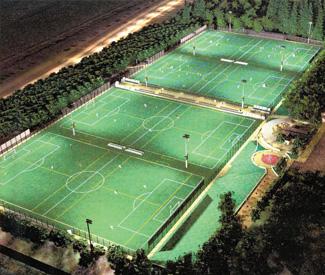A city project that would install artificial turf and stadium lighting at the Beach Chalet soccer fields at the west end of Golden Gate Park has survived numerous challenges over the last four years, including appeals to the California Coastal Commision and the courts. But this November, San Francisco voters will have the final say.
A citizens’ initiative that would block the project this week qualified for the ballot after turning in more than 16,000 signatures, collected by the Coalition to Save Golden Gate Park. Yet city officials and supporters of the project — including the City Fields Foundation, which has been installing artificial turf on playing fields around the city in recent years — aren’t taking any chances, creating a rival measure sponsored by six members of the Board of Supervisors.
Not only would the supervisors’ measure invalidate the citizens’ initiative if it gets more votes — it contains a so-called poison pill, an increasingly common electoral tactic — but it would make it more difficult to challenge future trail, playground, and playing field projects that would increase the number of users by 50 percent or more.
“We think it’s a terrible measure that disenfranchises voters all over the city,” Jean Barish, a spokesperson for the Coalition to Protect Golden Gate Park, told the Guardian. “It would give the Recreation and Park Department a lot more authority than they have now.”
Patrick Hannan, a spokesperson for the City Fields Foundation, worked with supervisors on the rival measure and he denies that it would limit citizens’ rights to challenge future projects.
“The legislation in no way curtails any kind of appeals process,” Hannan said. “It says you can’t pass a law to stop projects from going forward after they’ve been approved.”
But Hannan couldn’t cite any examples of approved projects being later stopped by legislation, and the vaguely worded measure doesn’t make clear whether it would preclude citizens from challenging approved projects by initiative or referendum.
Mike Murphy, the official proponent behind the iniative that seeks to stop the Beach Chalet project, said the intent of the supervisors’ measure seems to be to limit the public’s right to challenge artificial turf projects, which the city measure explicitly said city bodies “shall approve” if they increase playing time and have an approved environmental impact report.
He called on the supervisors sponsoring the measure — Sups. David Chiu, Eric Mar, Mark Farrell, Katy Tang, Scott Wiener, and London Breed — to remove their names before next week’s electoral deadline.
“This is a highly politicized issue and it always has been,” Murphy said. “We need to refocus the debate not on why [the city needs more playing fields] but on what’s being done at this site.”
Opponents of the Beach Chalet project say articificial turf can be toxic and unhealthy and that it shouldn’t replace natural grass. But supporters of this and other artificial turf projects say that they substantially increase the available playing time on fields that are desperately need to keep up with demand, particularly by youth sports.
“Artificial turf is safe and this project is cleared to proceed,” Hannan said. “The question is whether the city wants to give more kids more fields they can use.”
He cited studies showing that because the artificial turf his group has installed on city-owned fields since 2011, available playing time on fields has increased by 30 percent: “That’s a direct result of our project.”
And now, voters will get their chance to weigh in on this ongoing, highly charged turf war.

